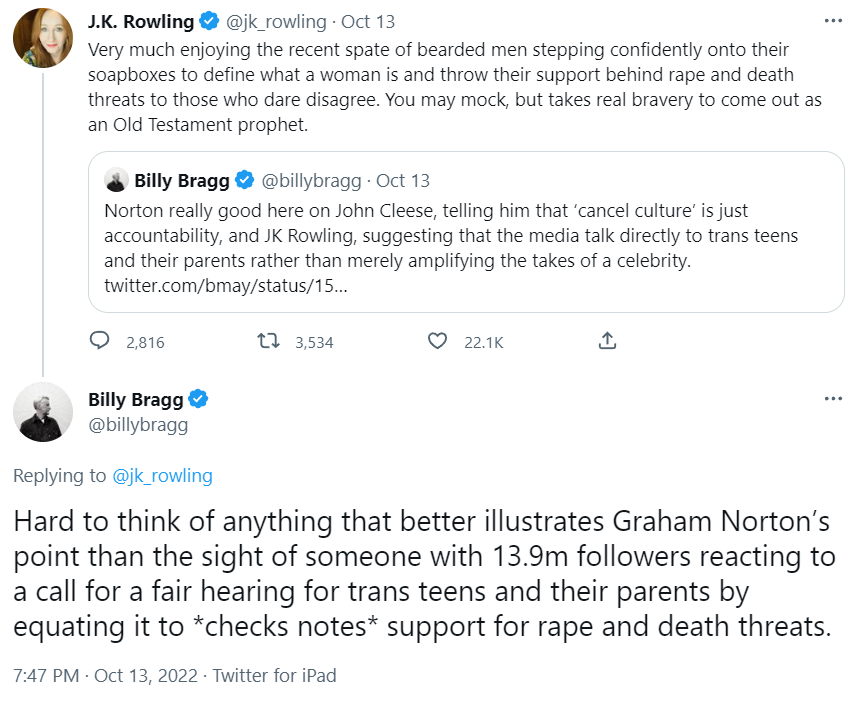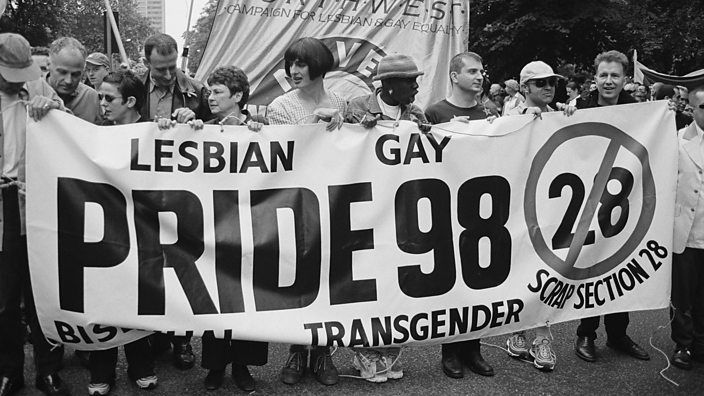TL;DR: After Graham Norton called on the media to speak to trans people instead of cisgender celebs about trans lives, he faced a media and social media storm. He closed his Twitter account and it’s left me reflecting on just how important accountability is.
Accountability is part of human life. It follows us everywhere. We see it at work, on the bus, and at home - as humans, we look to each other constantly.
So it's remarkable that somehow, accountability has been rebranded as something bad: ‘cancel culture’.
This week, Graham Norton left Twitter after being harangued for giving a calm and conscientious perspective on accountability and why we shouldn’t fear it - Times Radio
However, because the answer was based around trans rights, all the rules of civil conversation seemed to be thrown away.
Norton, who simply suggested that we should listen to the parents of trans children, and actual trans people themselves - imagine that - faced a litany of hate.
This followed singer Billy Bragg's reflections on Norton’s comments. Bragg shared the Times Radio clip, which mentioned JK Rowling and John Cleese.
Rowling read this as a direct attack and retorted that this was further evidence he supported “rape and death threats” against women. This was a stretch for many followers, including Bragg, who replied:
“Hard to think of anything that better illustrates Graham Norton’s point than the sight of someone with 13.9m followers reacting to a call for a fair hearing for trans teens and their parents by equating it to *checks notes* support for rape and death threats.”

Accountability is nothing to fear, if you've done nothing wrong
All of this gets really striking when you boil down what Norton said. Not only did he essentially predict this circus - he also made a crucial point.
We’ve always had accountability, and as a society, we rely on it. It’s part of democracy, law, and once upon a time it was the foundation of most journalism.
That's what used to be thought of as the key role of the press: to hold other parts of society to account.
That is the irony of a media that choose to bombard trans people. To make editorial choices with headlines like ‘Two trans people assault inmates in prisons over eight years' -The Times
This comes just weeks after they chose not to write headlines about a massive rise in hate crimes, where 4,355 trans people were attacked on the streets we’re supposed to all be safe on - a rise of 56% in just one year - BBC
Social media can be a cruel and tough place. But so can any place where we don’t have norms, standards and accountability to rely on. I believe in leading with the change you want to see. It's what this whole outlet is about.
That's why, even when I’m the victim of a pile-on, I remain polite to my detractors.
Why I follow and read articles from people and outlets I disagree with, so my ideas and beliefs are regularly tested.
Why, as Billy Bragg argues, freedom of expression doesn’t mean freedom from consequence - New Statesman

History rarely repeats, but it often rhymes
Despite all of this, I constantly reflect on how the hate we see so much of now is only temporary. While it feels insurmountable sometimes, I take great solace in what history tells us.
During the height of HIV in the '80s, the government failed to act to protect people, instead responding with anti-gay law Section 28.
They curtailed a small uptick in sentiment toward gay men and tried to keep us down for decades. But we fought back.
We reminded everyone that all we wanted was to love, live safely, and play our part - just like everyone else. Positive sentiment towards LGBQ people has increased and endured.
Now, the government is failing to act on Monkeypox and responding to so-called culture wars with anti-trans rhetoric.
Things will continue to get harder for a little while longer. But just like last time, we will fight back and win - because, ultimately, hope is stronger than the fear they are pedalling.
I won't give up, and I know the LGBTQIA+ community won’t either. And yes, you can hold me accountable to that.

We’re not afraid of accountability. It’s why we became the first, and remain the only, regulated LGBTQIA+ outlet in the UK.
This is our contract with our readers: we will always do our best to uphold the highest standards, and where we get things wrong, we will make them right.
The IMPRESS standards code protects the public from the worst practices of the media.
As we set out to model change, we believe this standards code will help create a safer environment for LGBTQIA+ stories in the press. We hope to see more publishers follow suit.
Our audience is our most valuable editor, and giving them ways to have their say is crucial. That’s why our ad-free member-funded model lets you set the agenda.
Have your say, and tell us what content is missing in the rest of the media - because we don’t commission based on ‘what creates clicks’. Everything we do is based on what you say should count.












